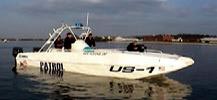
July 2004
Cover Look At the Numbers, Then Look Around Alabama Florida Georgia Tennessee Mississippi Carolinas Request Information 
|
SOUTHEASTERN STATES
Carolinas Constant
The Carolinas have two of the oldest right-to-work laws on the books, with both states enacting legislation within one day of one another in March 1947. Both states have historically had the two lowest unionization rates. The latest figures from the Bureau of Labor Statistics show North Carolina with the lowest percentage, at 3.1, followed by South Carolina with 4.2 percent. But 57 years after their enactment, are these laws a major component of a company's site selection equation? Industry recruiters say companies are aware of the law long before making site visits. "People are generally aware of right-to-work before they consider an area," says Terry Orell, group vice president for business growth at the Charlotte Chamber of Commerce. "A lot of the industry that looks in our direction have already determined we have an environment more suited to long-term capital investment. Companies are typically looking at a situation to see whether it's a non-union environment. All things being equal, they prefer a non-union environment. If we had a union environment, we would see less blue collar work in this neck of the woods." "It almost never comes up in the first round of discussion -- they just seem to know about it," says Ray Denny, director of the North Carolina Dept. of Commerce's Business & Industry Division. "It's probably mentioned by one company in a hundred that might have a union at another location. I'm sure it's a factor, but out of dozens of factors, I don't think it's among the top 10." Denny, who has served the department in several roles since 1968, says that when a company does bring right-to-work into a discussion, the company is usually an older, well-established firm with ties either to Europe or to union states in the U.S. Dr. Hoyt Wheeler, author of The Future of the American Labor Movement, offers a different take. "Right-to-work laws are part of an economic development strategy that actually started in the 1880s that attracted industry with cheap labor," says Wheeler, chairman of the manag ement department at the University of South Carolina's Moore School of Business. "It worked pretty well over a number of years and it brought the textile industry here." Wheeler, who has observed labor issues for more than 40 years, says the right-to-work law is a signal that organized labor is weak in the state, but it probably doesn't do very much to recruit industry. "It's wrapped up in a low-wage strategy which I think is obsolete," Wheeler says. "We can't compete for cheap labor with China and other parts of the world. Those who live by cheap labor die by cheap labor."
Security, Automotives
Push New Carolinas Projects Time was of the essence when Dutch chemicals group DSM began its search for a U.S. site to produce its unidirectional bullet-resistant material. After looking at seven sites in the Carolinas, DSM found a ready-to-go industrial facility in Greenville, N.C., three years ago. With demand rising as a result of national security issues, the company built an adjacent manufacturing facility to supply Dyneema, the high-tech fiber used in the materials. DSM opened its first U.S. Dyneema production line at the site in May 2004.
"The people who received us were extremely well prepared," says Frank Schaap, global marketing and sales director for Dyneema. "Because of the enormous pressure in the market, we were looking for speed and a site where we could begin manufacturing as soon as possible. Because our product is based on fibers and textiles, we chose the Carolinas to look at because there is quite a lot of textile expertise." Although DSM plans to serve global clients, it says the Greenville facility will handle U.S. military requests first due to the current world situation. Two recent projects in North Carolina's Piedmont region reflect growing demand from U.S. auto assemblers. ZF Lemforder Corp., one of the world's largest automotive suppliers, is building a 150,000-sq.-ft. (13,900-sq.-m.) factory in Newton to supply suspension components. The company plans to invest $28.8 million and employ 200 with an average annual salary of $33,400. And Viscotec Automotive Products, a manufacturer of automotive fabrics, is expanding its Morganton plant, creating 140 jobs. The automotive theme continues in South Carolina, where Fokoku, a supplier of rubber parts, is expanding its facility in Laurens. The $7-million investment will add 55,000 sq. ft. (5,109 sq. m.) of space and will generate about 50 new jobs. Homeland security is also bringing investment to South Carolina. Top Cat Marine Security, a maker of high-performance boats for defense, security and law enforcement applications, is moving manufacturing operations from New Jersey to St. Stephen, a Charleston suburb. Top Cat is investing $2 million and plans to create 75 jobs. Mary Ann Johnson, Top Cat's president, tells Site Selection her company looked at several potential sites, with Charleston rising to the top because of its long history of support for the military and boat building. "We were also guaranteed a nice, strong work force," Johnson says, "and it was an opportunity to move out of the New Jersey area." She says unfavorable zoning issues in Top Cat's former home of Galloway, N.J., prompted her company to look for a new location. Top Cat looked at several sites in the Charleston area as well as in Alabama. 
TOP OF PAGE
|
|
©2004 Conway Data, Inc. All rights reserved. SiteNet data is from many sources and not warranted to be accurate or current.
|
